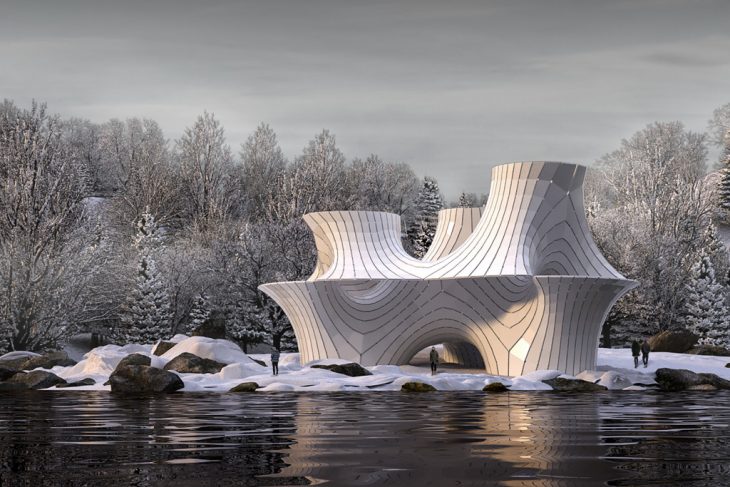INTRODUCTORY STUDIO G2
THE ARCHITECTURE OF ALGORITHMS
Seminar Faculty: Rodrigo Aguirre and Ivan Marchuk
With the growth of urban areas, cities are becoming focal points for human life, however they still lag behind in sustainability. When designing our built environment, it is therefore important to
consider the consequences of human settlements on the health of ecosystems. With the integration of computational technologies into architecture, designers are not only capable of simulating the impact of external forces in the digital environment, but also create design workflows to have constant analysis feedback of the building performance, allowing to optimise the ecological footprint of architectural interventions.

Credits: Minimal Surface
Brenda Freitas, Ibrahim Kukner, Francesco Polvi, Dusan Savicevic, Abhishek Sharma
Complex Forming Seminar 2019/20
This studio is centred in an investigation that creates a closer relationship between the designer, computer representation and matter. To actuate this, the studio focuses on an architectural context where, through the development of design processes, computational strategies and means of digital fabrication; the design of lightweight, low-mass and self supporting thin-shell systems emerge, pushing the limits of form, structure, and space.
The search of form represented through digital models, allows to represent endless types of manifolds and nonlinear morphologies. This enables new ways to describe complex self-supportive curvilinear surfaces into series of developable flat components with tangential overlaps for efficient fabrication and construction. With the aid of rapid prototyping there will be a constant feedback loop between design and fabrication.
The design process methodology will be treated as a computer algorithm, where different functions work in a programmed loop with rules and conditions that creates a constant output responding to the ever changing variables inputs. Form informs function at the same time that the program will inform the design, creating a closed circuit where each part of the project collaborates
in both directions of the design process embedded as architectural algorithms.

Credits: ThreeFourFive
Andrea Giacomo De Stasio, Deepika Raghu, Mario Sequeira, Rani Kamel, Saurabh Singla
Complex Forming Seminar 2019/20
This studio will focus on the design of temporary structures for multipurpose use in open public spaces of Barcelona, integrating programs that can benefit the surrounding community. The main challenge of the research is to question the relation between user needs and spaces and how it can transform the way users interact with their surroundings. Exploring the link between design form and functionality will allow the creation of a language that can be applied to an architectural project.
The studio course is set up as a collaboration think tank where invited guest tutors will join desk-crits in physical and digital format, to give inputs related to their area of expertise. This way each project will have constant questioning and focused feedback that will enrich the project in many key aspects of the investigation.